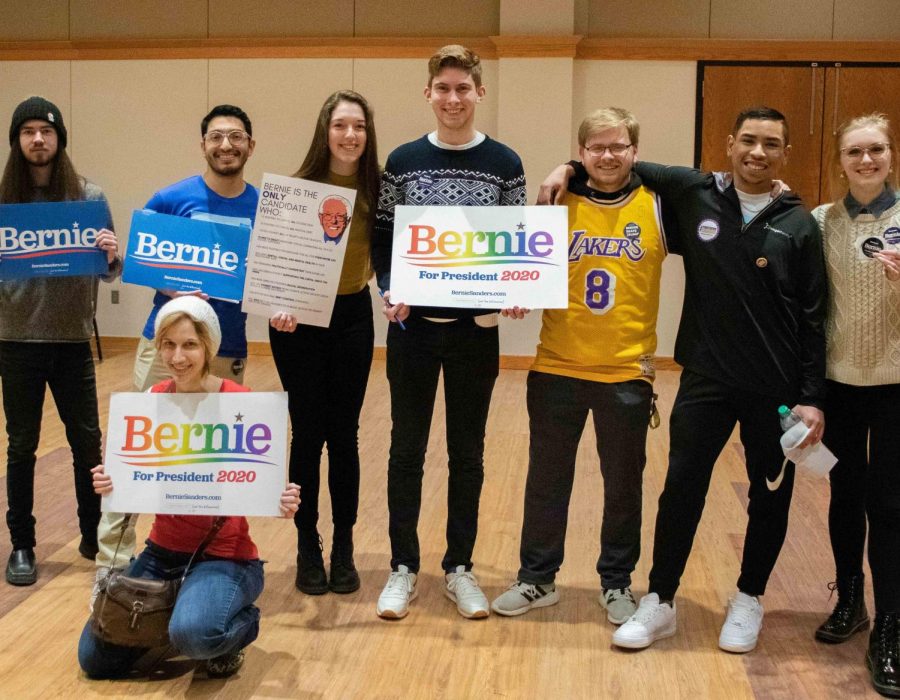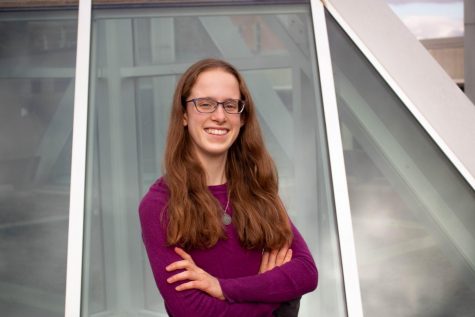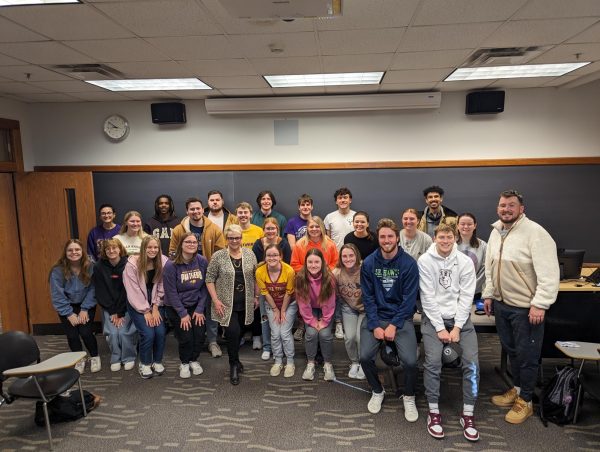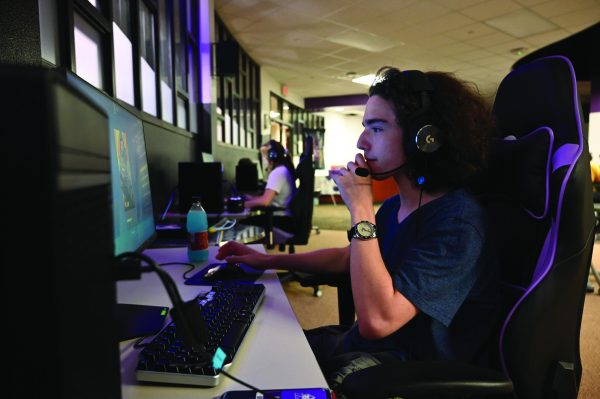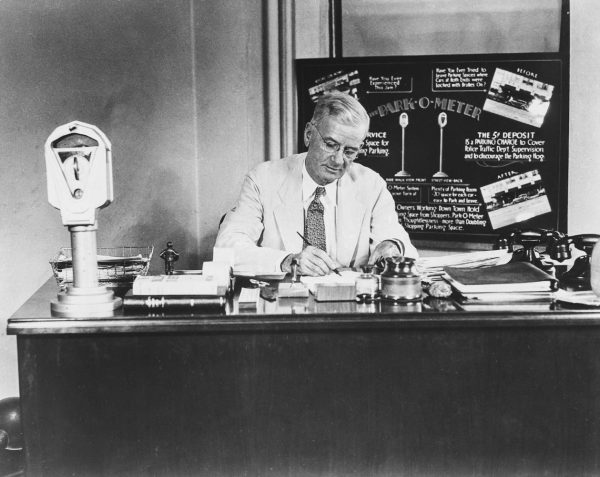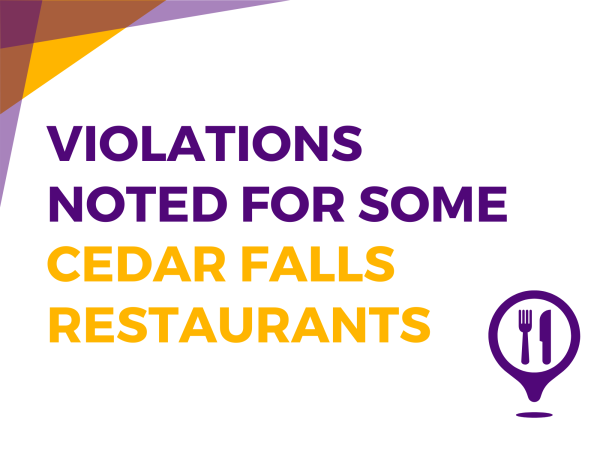Caucus results cause delay, confusion
A group of Sanders supporters pose for a photo at Maucker Union’s mock caucus on Monday, Jan. 27.
Feb 6, 2020
UNI students and community members turned out for the Iowa caucuses, but the caucuses didn’t quite turn out as planned.
Technical difficulties with a new app-based reporting system used for the first time this year by the Iowa Democratic Party led to a delay in the results of the first-in-the-nation caucus on Monday, Feb. 3.
Partial results were released on Tuesday afternoon, followed by additional results on Wednesday. As of Wednesday evening, with 86% of precincts reporting, Pete Buttigieg is narrowly leading the state, with Bernie Sanders in a close second and Elizabeth Warren and Joe Biden in third and fourth, respectively.
However, Buttigieg’s lead is complicated, and not only because results are not yet complete. This year, the Iowa Democratic Party reported not only each candidate’s state delegate equivalents (the percentage of Iowa’s delegates they won) but also their popular-vote numbers in the first and second alignment. And, though Buttigieg is currently leading Sanders in state delegate equivalents (27% to Sanders’ 25%), Sanders is narrowly ahead of Buttigieg in the two popular-vote counts.
The close Democratic race also played out on UNI’s two precinct locations, one in the West Gym and one in the Maucker Union Ballroom. At both locations, hundreds of students and community members packed the room to show their support for their candidate of choice.
Erin Thomason, a senior Spanish and political science major, served as the precinct chair for the West Gym precinct, which she said was almost entirely made up of UNI students.
“It was really high energy, especially being virtually all college students,” she said. “Almost everyone there, it was probably their first caucus, so it was really high energy and a lot of fun to be the one in charge helping to lead it and make sure everything went smoothly.”
Both UNI locations awarded nine delegates. At Thomason’s precinct in the West Gym, Sanders received four delegates, Warren three and Buttigieg two, while across campus in the Maucker Union precinct, Sanders received three delegates with Warren, Buttigieg and Klobuchar each earning two.
But when Thomason and her precinct secretary attempted to report their results to the state party, they ran into the same roadblocks which were frustrating caucus organizers across the state. The reporting app experienced coding issues, according to party officials, leading to only partial reporting of results, and many precinct officials were unable to download the app at all.
That was the case with Thomason’s precinct.
“My precinct secretary was never able to get the app to work in the first place, so that was never an option for us at all,” she said.
The backup plan was a hotline number from the Iowa Democratic Party, which Thomason said she used without incident earlier in the evening when the precinct ran out of voter registration forms. However, later in the night, as the failure of the app at many precincts forced organizers to call the hotline, state officials became overwhelmed, leading to delays.
“You could definitely tell that everyone was trying to call at the same time,” Thomason said.
She said that her precinct secretary was on hold for an hour before his phone automatically hung up, forcing them to take their results to the Black Hawk County Democrats office in Waterloo. Once there, she said, they were told to take a picture of their results and submit it via email to the state party.
“So yes, we had some issues, but we were able to get it in, and it was fine,” she said. “And what the Iowa Democratic Party is really emphasizing is that there’s a good paper trail, it’s not like anything was hacked or anything. The app was just doing partial reporting, so they weren’t able to get all the results. They’re just trying to make sure everything is accurate and thoroughly checking it before they release everything.”
Regardless of the bumps in the reporting process, UNI students who participated in the caucuses viewed the experience as a positive one. Freshman undecided major Mia Schemmel, who caucused for Buttigieg at the Maucker Union location, was excited to participate in her first Iowa caucus.
“I’m from Illinois, so this is a totally new experience for me and really awesome to be a part of,” she said. “It was complicated, but it was just super cool and not what I was expecting.”
Schemmel was joined at the Maucker Union site by Kendall Doerr, a junior social studies education major.
“I was really excited about the turnout we had here, and honestly so proud of UNI as a community for pushing people to caucus,” said Doerr, who caucused for Warren. “In every class I went to today, the professor said, ‘Hey, it’s caucus day, get out and vote.’ [It’s] just recognizing how special it is that we are the first in the nation.”
That first-in-the-nation status, and the media and candidate attention it brings to Iowa, were both already under scrutiny in this year’s election cycle. The caucus process itself has been criticized as undemocratic because of the in-person requirements which limit voter participation. In addition, many have pointed out that Iowa, both in terms of demographics and delegate power (Iowa awards just 41 pledged delegates, or 1% of the total, to the national convention), is hardly representative of the nation as a whole.
Now, Monday’s reporting difficulties have cast even greater doubts on a process that many were already questioning. Both media outlets such as the Washington Post and political figures like Senate Minority Whip Dick Durbin (D-Ill.) have called for the 2020 Iowa caucus to be the last.
“I think the Democratic caucus in Iowa is a quirky, quaint tradition, which should come to an end,” Durbin said on MSNBC on Tuesday.
However, Thomason said that she “doubts” that the difficulties will signal the end for the Iowa caucus.
“It won’t be the end without a very big fight from both the Iowa Democratic Party and the [Iowa] Republican Party,” she said. “Both of them hold their first-in-the-nation status very close to their hearts, and they’ve made that very clear with any controversy or criticism, [both] of Iowa being first and just of the whole caucus event. If the National Democratic Party steps in, maybe, but it definitely won’t be without a fight.”


